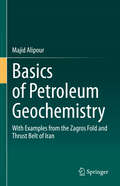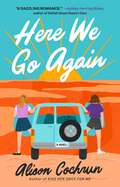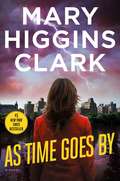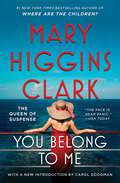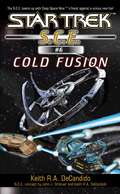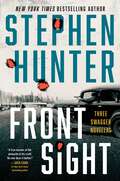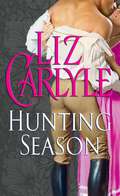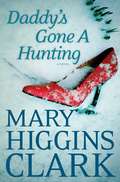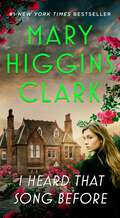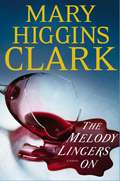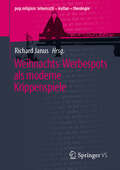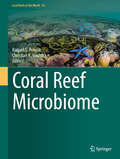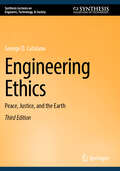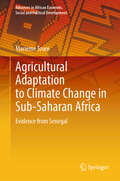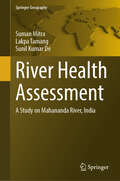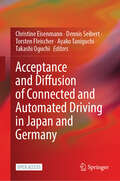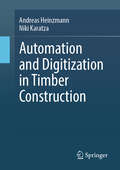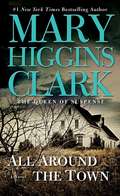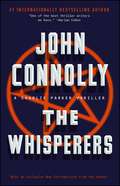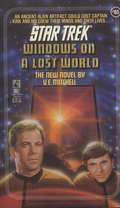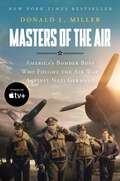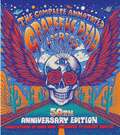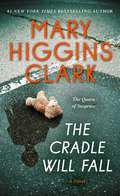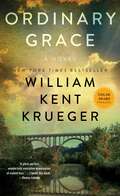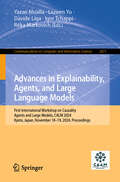- Table View
- List View
Basics of Petroleum Geochemistry: With Examples from the Zagros Fold and Thrust Belt of Iran
by Majid AlipourThis book provides a concise summary about fundamental aspects of petroleum geology and geochemistry for graduate students, primarily from non-English-speaking countries. These fundamentals constitute about 40% of the book, while the remaining 60% deals with regional examples from petroleum geology of the Zagros basin of Iran. The regional examples are prepared using both published and unpublished (proprietary) data. The aim is to familiarize readers with the fundamental aspects of petroleum geochemistry and then provide typical examples from one of the world&’s most prolific petroleum provinces.
Here We Go Again: A Novel
by Alison CochrunOne of Elle&’s Best Romance Novels of 2024 A Publishers Weekly and Book Riot Best Romance of 2024 The author of the &“sexy, insightful, and utterly charming&” (BuzzFeed) Kiss Her Once for Me returns with a new queer rom-com following once childhood best friends forced together to drive their former teacher across the country.A long time ago, Logan Maletis and Rosemary Hale used to be friends. They spent their childhood summers running through the woods, rebelling against their conservative small town, and dreaming of escaping. But then an incident the summer before high school turned them into bitter rivals. After graduation, they went ten years without speaking. Now in their thirties, Logan and Rosemary find they aren&’t quite living the lives of adventure they imagined for themselves. Still in their small town and working as teachers at their alma mater, they&’re both stuck in old patterns. Uptight Rosemary chooses security and stability over all else, working constantly, and her most stable relationship is with her label maker. Chaotic and impulsive Logan has a long list of misguided ex-lovers and an apathetic shrug she uses to protect herself from anything real. And as hard as they try to avoid each other—and their complicated past—they keep crashing into each other. Including with their cars. But when their beloved former English teacher and lifelong mentor tells them he has only a few months to live, they&’re forced together once and for all to fulfill his last wish: a cross-country road trip. Stuffed into the gayest van west of the Mississippi, the three embark on a life-changing summer trip—from Washington state to the Grand Canyon, from the Gulf Coast to coastal Maine—that will chart a new future and perhaps lead them back to one another.
As Time Goes By: A Novel
by Mary Higgins ClarkThe #1 New York Times bestselling &“Queen of Suspense&” Mary Higgins Clark crafts a thrilling mystery in which a news reporter develops an interest in her birth parents just as she is assigned to cover the high-profile trial of a woman accused of murdering her wealthy husband.Television journalist Delaney Wright is on the brink of stardom when she begins covering a sensational murder trial. She should be thrilled with the story of her career, but her growing desire to locate her birth mother consumes her thoughts. When Delaney&’s friends Alvirah Meehan and her husband Willy offer to look into the mystery surrounding her birth, they uncover a shocking secret they do not want to reveal. On trial for murder is Betsy Grant, widow of a wealthy doctor who has suffered from Alzheimer&’s for eight years. When her once-upon-a-time celebrity lawyer urges her to accept a plea bargain, Betsy refuses: she will go to trial to prove her innocence. Betsy&’s stepson, Alan Grant, bides his time nervously as the trial begins. His substantial inheritance hangs in the balance—his only means of making good on payments he owes his ex-wife, his children, and increasingly angry creditors. As the trial unfolds and the damning evidence against Betsy piles up, Delaney is convinced that Betsy is not guilty and frantically tries to prove her innocence. A true classic from Mary Higgins Clark, As Time Goes By is a thrilling read by &“the mistress of high tension&” (The New Yorker).
You Belong To Me
by Mary Higgins Clark&“The mistress of high tension&” (The New Yorker) and undisputed Queen of Suspense Mary Higgins Clark brings us another New York Times bestselling novel that USA TODAY calls &“her page-turning best&” about a killer who targets lonely women on cruise ships, a masterful combination of page-turning suspense and classic mystery.When Dr. Susan Chandler decides to use her daily radio talk show to explore the phenomenon of women who disappear and are later found to have become victims of killers who prey on the lonely and insecure, she has no idea that she is exposing herself—and those closest to her—to the very terror that she hopes to warn others against. Susan sets out to determine who is responsible for an attempt on the life of a woman who called in to the show offering information on the mysterious disappearance from a cruise ship, years before, of Regina Clausen, a wealthy investment advisor. Soon Susan finds herself in a race against time, for not only does the killer stalk these lonely women, but he seems intent on eliminating anyone who can possibly further Susan&’s investigation. As her search intensifies, Susan finds herself confronted with the realization that one of the men who have become important figures in her life might be the killer. And as she gets closer to uncovering his identity, she realizes almost too late that the hunter has become the hunted. Is she the next one marked for murder?
Cold Fusion (Star Trek: Starfleet Corps of Engineers #6)
by Keith R. DeCandidoSTARFLEET CORPS OF ENGINEERS Following the catastrophic conclusion of Avatar, Lieutenant Nog -- the chief operations officer of space station Deep Space 9 -- joins forces with the crew of the U.S.S. da Vinci! With the station's future in doubt, Nog meets the da Vinci at Empok Nor, Deep Space 9's long-abandoned twin, in order to salvage vital technology. But they arrive to find that someone has beaten them to it -- an enigmatic and dangerous alien race known as the Androssi. When the S.C.E. crew learns what the Androssi have planned for Empok Nor, it threatens not only the lives of the da Vinci and Deep Space 9 crews, but galactic peace itself!
Front Sight: Three Swagger Novellas (Earl Swagger)
by Stephen HunterA collection of three interconnected novellas that follow each generation of the iconic Swagger family—grandfather Charles, father Earl, and fan favorite hero Bob Lee—from New York Times bestselling author, Pulitzer Prize winner, and &“true master at the pinnacle of his craft&” (Jack Carr, #1 New York Times bestselling author) Stephen Hunter.In City of Meat, Charles Swagger is on the hunt for notorious bank robber Baby Face Nelson when he traces a tip to the Chicago stock yards. While there, he&’s brutally assaulted by a madman involved in a nearby narcotics ring. The ring plans to spread its new drug to the residents of the disenfranchised 7th District of Chicago and to make matters worse, this is no ordinary drug—it makes some users happy, drives others insane, and kills many of the rest. Will Charles be able to stop the ring before it&’s too late? Or is he in over his head among the dark streets of Chicago? Earl Swagger investigates a violent bank robbery that left two dead and a fortune missing in small-town Maryland in Johnny Tuesday. At every turn, however, he&’s met with silence and hostility from the townsfolk, which makes sense when he uncovers municipal corruption, gang politics, jaded aristocrats, scheming gamblers, a hitman, a femme fatale, and a whole bunch of men with guns. Luckily, Earl has brought his own guns in this unputdownable noir mystery. Finally, in Five Dolls for the Gut Hook, a thirty-two-year-old Bob Lee Swagger is back from Vietnam nearly broken over good men lost for nothing. He&’s turned down that whiskey road to hell. But one afternoon he&’s awakened from his nightmares by two men with a problem. As nearby Hot Springs tries to retool its image from gambling paradise to family resort, a butcher has begun to prey on the city&’s young women, a figure straight out of a horror movie. Hot Springs Homicide is baffled and recruit Bob&’s help. &“I&’m a sniper,&” says Bob, &“not a detective.&” &“But,&” comes the reply, &“you are the son and grandson of two of the greatest detectives this state has ever produced.&” On that premise alone, Bob takes up the hunt for a killer who not only kills but desecrates. At the same time, we understand that Bob Lee Swagger is also hunting for his own salvation.
Hunting Season
by Liz CarlyleNow available as an eBook, the New York Times bestselling author’s beloved Regency romance brings together the vengeful Christian Villiers, the Marquis of Grayston, and the fiery Lady Elise Middleton.Now available as an eBook, Hunting Season tells the story of Christian Villiers, the Marquis of Grayston, who returns to England determined to ruin the man responsible for his beloved sister's suicide. Seducing the cad's intended, Lady Elise Middleton, would be a bonus. But during an elaborate house party, Christian realizes he has met his match in the fiery and passionate Elise...and soon he must decide whether a moment of vengeance is worth risking a lifetime of love.
Daddy's Gone A Hunting
by Mary Higgins ClarkIn this "tantalizing" (Booklist) novel, Mary Higgins Clark, the #1 New York Times bestselling Queen of Suspense, exposes a dark secret from a family&’s past that threatens the lives of two sisters.What was Kate Connelly—a tall, glamorous CPA—doing in her family&’s antique furniture museum when it exploded into flames in the middle of the night? Why was Gus—a disgruntled retired employee—with her? Now Gus is dead, and Kate lies in a coma, unable to explain the tragedy&’s mysterious link to a decades-old missing persons case. And unable to warn her sister what could happen next. In a novel of dazzling suspense and excitement, Mary Higgins Clark once again demonstrates the mastery of her craft that has made her books international bestsellers for years. She presents the reader with a perplexing mystery, a puzzling question of identity, and a fascinating cast of characters—one of whom may just be a ruthless killer.
I Heard That Song Before: A Novel
by Mary Higgins ClarkIn a riveting psychological thriller, Queen of Suspense Mary Higgins Clark takes you deep into the mysteries of the human mind, where memories may be the most dangerous things of all.Kay Lansing, who has grown up in Englewood, New Jersey, is the daughter of the landscaper to the wealthy and powerful Carrington family. Their mansion—a historic 17th-century manor house transported stone by stone from Wales in 1848—has a hidden chapel. One day, accompanying her father to work, six-year-old Kay succumbs to curiosity and sneaks into the chapel. There, she overhears a quarrel between a man and a woman who is demanding money from him. When she says that this will be the last time, his caustic response is: &“I heard that song before.&” That same evening, the Carrington&’s hold a formal dinner dance after which Peter Carrington, a student at Princeton, drives home Susan Althorp, the eighteen-year-old daughter of neighbors. While her parents hear her come in, she is not in her room the next morning and is never seen or heard from again. Throughout the years, a cloud of suspicion hangs over Peter Carrington. At age forty-two, head of the family business empire, he is still &“a person of interest&” in the eyes of the police, not only for Susan Althorp&’s disappearance but also for the subsequent drowning death of his own pregnant wife in their swimming pool. Kay, now living in New York and working as a librarian in Englewood, goes to see Peter. Kay comes to see Peter as maligned and misunderstood, and when he begins to court her, she falls in love with him. Over the objections of her beloved grandmother, she marries him. To her dismay, she soon finds that he is a sleepwalker whose nocturnal wanderings draw him to the spot at the pool where his wife met her end. Kay develops gnawing doubts about her husband. She believes that the key to the truth about his guilt or innocence lies in the scene she witnessed as a child in the chapel and knows she must learn the identity of the man and woman who quarreled there that day. What Kay does not even remotely suspect is that uncovering what lies behind these memories may cost her her own life. I Heard That Song Before once again dramatically reconfirms Mary Higgins Clark&’s worldwide reputation as a master storyteller.
The Melody Lingers On
by Mary Higgins ClarkA headline-making finance scandal and a breathtaking tale of deception collide in #1 New York Times bestselling author Mary Higgins Clark’s finest thriller yet.As the sole assistant to a famous upscale interior designer, Lane Harmon is accustomed to visiting opulent homes. So her latest job at a modest New Jersey townhouse is unusual. Then she learns the home belongs to the wife of disgraced finance magnate Parker Bennett, who vanished two years earlier, along with the five billion dollar hedge fund he managed. The debate over whether Bennett was suicidal or staged his disappearance still continues. Both his clients and the federal government want to trace the money and find him. But Lane is surprisingly moved by Mrs. Bennett’s steadfast faith in her husband’s innocence. Gradually, Lane is also drawn to the Bennetts’ son, Mark, who is equally determined to prove his father is not guilty. What she doesn’t realize is the closer she gets to the notorious family, the more her life—and that of her five-year-old daughter—is in jeopardy.
Weihnachts-Werbespots als moderne Krippenspiele (pop.religion: lebensstil – kultur – theologie)
by Richard JanusSupermarktketten produzieren jedes Jahr zu Weihnachten eigene Werbespots. Diese greifen aktuelle gesellschaftliche Entwicklungen auf und inszenieren diese sozialkritisch. Von Fragen des Umgangs mit Künstlicher Intelligenz bis hin zu den Folgen von Corona für Jugendliche spannt sich mittlerweile der Bogen. Diese Clips sind zu einem eigenen Genre geworden. Im Grunde sind es kleine Krippenspiele, die nun nicht mehr in der Kirche aufgeführt werden, sondern über die verschiedenen Medien verbreitet werden. Ein direktes Vorbild für die Clips sind die Werbefilme zum Super Bowl in den USA.
Coral Reef Microbiome (Coral Reefs of the World #20)
by Christian R. Voolstra Raquel S. PeixotoMicroorganisms, the catalysts of all biogeochemical cycles on Earth, are the origin and essence of life—an invisible yet powerful force sustaining all living organisms. The health of both individual organisms and ecosystems critically depends on functional microbiomes that drive essential processes such as nutrient cycling, pathogen control, detoxification, and resilience. However, like their macroorganism counterparts, these beneficial microbes are vulnerable to environmental changes, and their decline often accelerates ecosystem degradation. Anthropogenic impacts have profoundly altered and often degraded most ecosystems and their microbiomes, with coral reefs being no exception. Stony corals, the foundation of these vibrant ecosystems, are among the most threatened marine organisms. Shifts in coral microbiomes toward dysbiotic (harmful) assemblages are increasingly recognized as both a cause and consequence of coral mortality. In response, active intervention strategies are being developed to restore and rehabilitate degraded microbiomes, aiming to restore and re-establish the beneficial microbial communities that sustain the health of both their host organisms and ecosystems. The success of these approaches depends on our understanding of the distribution, ecological roles, and interactions between corals and their associated microbiomes, as well as how environmental factors influence them and their potential to either amplify or mitigate anthropogenic impacts. This book delves into these topics, examining how they shape coral holobiont assemblages and offer pathways for active intervention. In addition, this book provides a practical, tailored, and adaptable roadmap for stakeholders to integrate the latest insights into a broader One Health framework and ecosystem perspective.
Engineering Ethics: Peace, Justice, and the Earth (Synthesis Lectures on Engineers, Technology, & Society)
by George D. CatalanoIn the original two editions of Engineering Ethics: Peace, Justice, and the Earth, a response of the engineering profession to the challenges of security, poverty and underdevelopment, environmental sustainability, and native cultures was described. Ethical codes, which govern the behavior of engineers, were examined from a historical perspective linking the prevailing codes to models of the natural world. A new ethical code based on a recently introduced model of Nature as an integral community was provided and discussed. Applications of the new code were described using a case study approach. The proposed third edition will build on the foundational material included in the previous two editions. Over the course of the last decade new and profoundly challenging ethical issues (synthetic biology, artificial intelligence, climate change and the sixth extinction) have arisen in the engineering profession. The notion of an integral community has been more fully developed. The proposed book will include an exploration of these issues as well as provide the reader with a better understanding of the historical development of ethical reasoning and consider future possibilities. Implications of the innovative ideas in ethics and design on engineering education are also considered.
Agricultural Adaptation to Climate Change in Sub-Saharan Africa: Evidence from Senegal (Advances in African Economic, Social and Political Development)
by Marieme ToureIn the light of the impact of extreme weather events, declining agricultural productivity and child malnutrition in sub-Saharan Africa, this book explores the potential for sustainable agriculture to better respond to climate-related threats. By presenting a case study of Senegal, the author offers insights into the impact of climate change on long-term crop production, food security, and child malnutrition. Furthermore, the study sheds new light on the financialization of agricultural production and foreign direct investments, discusses policy instruments and adaptation strategies for implementing sustainable agriculture, and highlights the role of green financing instruments to enable the harmonization of private financing and green infrastructure. It will appeal to scholars of agricultural and development economics, and anyone interested in climate risk mitigation strategies and sustainable agriculture to achieve a green transition in sub-Saharan Africa.
River Health Assessment: A Study on Mahananda River, India (Springer Geography)
by Suman Mitra Lakpa Tamang Sunil Kumar DeThis book provides in detail assessment of the health of Mahananda river, an important head water river system in the Darjeeling Sub-Himalayas which is getting altered rapidly with the pace of human interference. It covers all aspects of river health monitoring through an effective method combining geospatial analysis and field measurements for the assessment of the hydromorphological, hydrochemistry, and hydrobiological quality which indicates that it is neither maintaining its overall fluvial characteristics and functions, nor can quickly replenish, supporting local biota and sediment transport. This book also identifies the factors responsible for existing health condition and suggests target-oriented restoration measures for the sustenance of river health essential for restoring the hydro-ecological balance of one of the most degraded river. The book can be utilized as reference materials by academics, practitioners, and decision-makers for the health assessment of other river basins.
Acceptance and Diffusion of Connected and Automated Driving in Japan and Germany
by Christine Eisenmann Dennis Seibert Torsten Fleischer Ayako Taniguchi Takashi OguchiThis open access book gives comprehensive empirical insights on connected and automated driving (CAD) of road transport vehicles which leads to the driver being partially or completely replaced by automation. The current trend towards widespread research and development of automation of motorised individual transport is driven by the expected benefits, such as increased road safety, smoother traffic flow, reduction of congestion, or use of driving time for other activities. CAD has the potential to change several dimensions of the transport system, ranging from changes in car ownership to the availability of entirely new mobility services. Some proponents even expect CAD to revolutionise the current transport system as a whole. In order to make informed statements about the possible impact of CAD on transport systems, research must consider a wide range of open questions: In what way do the existing framework conditions of the prevailing mobility systems affect the impact of CAD? How does the governance style relate to regulatory changes and resource allocation in the development of CAD? Is an autonomous ride-hailing service really a profitable business case? What are the attitudes and expectations towards CAD in the general public? What are the effects of CAD on transport systems? What are other impacts of CAD that should be assessed? All of these questions were addressed within different projects as part of the Japanese-German Research Cooperation on CAD and can be discovered by the reader of this book.
Automation and Digitization in Timber Construction
by Andreas Heinzmann Niki KaratzaIn this work, the authors provide an overview of the manufacturing principles possible in timber construction, such as batch, line, and cell production, and assess these approaches in relation to the requirements of different timber construction companies. In a further step, technological possibilities for all relevant processes in timber construction production are discussed. Due to the authors' strong ties to science and research, the technological approaches are analyzed for their potential strengths and weaknesses, offering the reader a neutral perspective, independent of manufacturer arguments. The authors not only address key questions that arise regarding new construction or expansion of production, but also present solutions that help optimize and digitize the entire process, from order generation to the completion of a construction project. A central guiding principle of the authors is the realization that optimizing a single area in production cannot fully harness the potential of the entire timber construction process.
All Around The Town
by Mary Higgins ClarkMary Higgins Clark, the Queen of Suspense, crafts a terrifying story of murder and obsession with &“a slambam finish&” (Los Angeles Times Book Review).When Laurie Kenyon, a twenty-one-year-old student, is accused of murdering her English professor, she has no memory of the crime. Her fingerprints, however, are everywhere. When she asks her sister, attorney Sarah, to mount her defense, Sarah in turn brings in psychiatrist Justin Donnelly. Kidnapped at the age of four and victimized for two years, Laurie has developed astounding coping skills. Only when the unbearable memories of those lost years are released can the truth of the crime come out—and only then can the final sadistic plan of her abductor, whose obsession is stronger than ever, be revealed.
The Whisperers: A Charlie Parker Thriller (Charlie Parker #9)
by John ConnollyNew York Times bestselling author John Connolly chills with this brutal, spine-tingling Charlie Parker thriller depicting a terrifying consequence of the Iraq War that nobody could have foreseen.In the dark reaches of Maine’s North Woods, a group of Iraq War veterans are engaged in a ruthless smuggling operation across the Canadian border. But what they have unleashed is far more dangerous than even they realize—an ancient evil locked away in Iraq for centuries. Evil has dogged Charlie Parker’s steps, costing him his career as a cop and his license as a private investigator. Now, as veterans begin dying mysteriously, he is called in to stop the bloodletting. But the smuggled objects have attracted the attention of the reclusive Herod and his henchman, the shadowy figure he calls the Captain. To defeat them, Parker must form an uneasy alliance with a man he fears more than any other: the killer known as the Collector.
Windows on a Lost World (Star Trek: The Original Series #65)
by V.E. MitchellWindows On A Lost World While Captain Kirk and a landing party from the Starship Enterprise explore the ruins of an ancient civilization on the uninhabited planet Careta IV, they discover strange devices that appear to be windows.But the mysterious windows prove to be more than they seem when Kirk, Chekov, and two security guards enter them and disappear. Suddenly, Kirk and his team find themselves find themselves trapped in a strange alien enviorment and must fight with all their strength to survive and keep their sanity. Now Spock must locate his missing comrades and solve the window's ancient mysteries before his captain and crewmates are lost forever....
Masters of the Air: America's Bomber Boys Who Fought the Air War Against Nazi Germany
by Donald L. MillerThe inspiration for the major Apple TV+ series, streaming now! The riveting history of the American Eighth Air Force in World War II and the young men who flew the bombers that helped beat the Nazis and liberate Europe, brilliantly told by historian and World War II expert Donald L. Miller. The Masters of the Air streaming series stars Austin Butler and Callum Turner, and is produced by Tom Hanks and Steven Spielberg, the legendary duo behind Band of Brothers and The Pacific. Masters of the Air is the deeply personal story of the American bomber boys in World War II who brought the war to Hitler&’s doorstep. With the narrative power of fiction, Donald Miller takes you on a harrowing ride through the fire-filled skies over Berlin, Hanover, and Dresden and describes the terrible cost of bombing for the German people. Masters of the Air is the deeply personal story of the American bomber boys in World War II who brought the war to Hitler&’s doorstep. With the narrative power of fiction, Donald Miller takes you on a harrowing ride through the fire-filled skies over Berlin, Hanover, and Dresden and describes the terrible cost of bombing for the German people. Fighting at 25,000 feet in thin, freezing air that no warriors had ever encountered before, bomber crews battled new kinds of assaults on body and mind. Air combat was deadly but intermittent: periods of inactivity and anxiety were followed by short bursts of fire and fear. Unlike infantrymen, bomber boys slept on clean sheets, drank beer in local pubs, and danced to the swing music of Glenn Miller&’s Air Force band, which toured US air bases in England. But they had a much greater chance of dying than ground soldiers. The bomber crews were an elite group of warriors who were a microcosm of America—white America, anyway. The actor Jimmy Stewart was a bomber boy, and so was the &“King of Hollywood,&” Clark Gable. And the air war was filmed by Oscar-winning director William Wyler and covered by reporters like Andy Rooney and Walter Cronkite, all of whom flew combat missions with the men. The Anglo-American bombing campaign against Nazi Germany was the longest military campaign of World War II, a war within a war. Until Allied soldiers crossed into Germany in the final months of the war, it was the only battle fought inside the German homeland. Masters of the Air is &“a stunning achievement&” (David McCullough), &“a fresh new account&” (Walter Boyne, former director of the Smithsonian Air and Space Museum) of life in wartime England and in the German prison camps, where tens of thousands of airmen spent part of the war. It ends with a vivid description of the grisly hunger marches captured airmen were forced to make near the end of the war through the country their bombs destroyed. Drawn from recent interviews, oral histories, and American, British, German, and other archives, Masters of the Air is an authoritative, deeply moving account that &“accurately and comprehensively&” (Lt. Gen. Bernard E. Trainor, USMC (Ret.) and coauthor of Cobra II) tells of the world&’s first and only bomber war.
The Complete Annotated Grateful Dead Lyrics
by David G. DoddCelebrate the fiftieth anniversary of the most popular and enduring band ever: &“Even the most hardcore Deadheads will be impressed by this obsessively complete look at the Grateful Dead&’s lyrics&” (Publishers Weekly).The Complete Annotated Grateful Dead Lyrics is an authoritative text, providing standard versions of all the original songs you thought you knew forwards and backwards. These are some of the best-loved songs in the modern American songbook. They are hummed and spoken among thousands as counterculture code and recorded by musicians of all stripes for their inimitable singability and obscure accessibility. How do they do all this? To provide a context for this formidable body of work, of which his part is primary, Robert Hunter has written a foreword that goes to the heart of the matter. And the annotations on sources provide a gloss on the lyrics, which goes to the roots of Western culture as they are incorporated into them. An avid Grateful Dead concertgoer for more than two decades, David Dodd is a librarian who brings to the work a detective’s love of following a clue as far as it will take him. Including essays by Dead lyricists Robert Hunter and John Perry and Jim Carpenter’s original illustrations, whimsical elements in the lyrics are brought to light, showcasing the American legend that is present in so many songs. A gorgeous keepsake edition of the Dead’s official annotated lyrics, The Complete Annotated Grateful Dead Lyrics is an absolute must-have for the fiftieth anniversary—you won’t think of this cultural icon the same way again. In fact, founding band member Bob Weir said: “This book is great. Now I’ll never have to explain myself.”
The Cradle Will Fall: A Novel
by Mary Higgins ClarkA &“superbly plotted&” (Los Angeles Times) page-turning classic from the undisputed Queen of Suspense and #1 New York Times bestselling author Mary Higgins Clark.A minor road accident landed county prosecutor Katie DeMaio in Westlake Hospital. That night, from her window, she thought she saw a man load a woman&’s body into the trunk of a car...or was it just a sleeping pill induced nightmare? At work the next day, Katie began investigating a suicide that looked more like murder. Initial evidence pointed elsewhere, but medical examiner Richard Carroll saw a trail leading to Dr. Edgar Highley. He suspected that the famous doctor&’s work &“curing&” infertile women was more than controversial—that it was deceitful, depraved, and often deadly. But before Richard could tell Katie his fears, she left the office for the weekend and an appointment for routine surgery...in Dr. Highley&’s operating room. &“A harrowing tale&” (The New York Times Book Review) that&’s &“indescribably suspenseful&” (San Francisco Chronicle), The Cradle Will Fall is a page-turning thriller of the highest order.
Ordinary Grace: A Novel
by William Kent KruegerNEW YORK TIMES BESTSELLER WINNER OF THE 2014 EDGAR AWARD FOR BEST NOVEL WINNER OF THE 2014 DILYS AWARD A SCHOOL LIBRARY JOURNAL BEST BOOK OF 2013 From New York Times bestselling author William Kent Krueger, a brilliant new novel about a young man, a small town, and murder in the summer of 1961.“That was it. That was all of it. A grace so ordinary there was no reason at all to remember it. Yet I have never across the forty years since it was spoken forgotten a single word.” New Bremen, Minnesota, 1961. The Twins were playing their debut season, ice-cold root beers were selling out at the soda counter of Halderson’s Drugstore, and Hot Stuff comic books were a mainstay on every barbershop magazine rack. It was a time of innocence and hope for a country with a new, young president. But for thirteen-year-old Frank Drum it was a grim summer in which death visited frequently and assumed many forms. Accident. Nature. Suicide. Murder. Frank begins the season preoccupied with the concerns of any teenage boy, but when tragedy unexpectedly strikes his family—which includes his Methodist minister father; his passionate, artistic mother; Juilliard-bound older sister; and wise-beyond-his-years kid brother—he finds himself thrust into an adult world full of secrets, lies, adultery, and betrayal, suddenly called upon to demonstrate a maturity and gumption beyond his years. Told from Frank’s perspective forty years after that fateful summer, Ordinary Grace is a brilliantly moving account of a boy standing at the door of his young manhood, trying to understand a world that seems to be falling apart around him. It is an unforgettable novel about discovering the terrible price of wisdom and the enduring grace of God.
Advances in Explainability, Agents, and Large Language Models: First International Workshop on Causality, Agents and Large Models, CALM 2024, Kyoto, Japan, November 18–19, 2024, Proceedings (Communications in Computer and Information Science #2471)
by Réka Markovich Yazan Mualla Liuwen Yu Davide Liga Igor TchappiThis book constitutes the refereed proceedings of the First International Workshop on Advances in explainability, agents, and large language models, CALM 2024, held in Kyoto, Japan, during November 18–19, 2024. The 7 full papers and 1 short paper presented in this book were carefully reviewed and selected from 17 submissions. The Workshop on Causality, Agents, and Large Models (CALM) was established to foster interdisciplinary collaboration and advance research at the intersection of causal reasoning, multi-agent systems (MAS), and large language models (LLMs).
